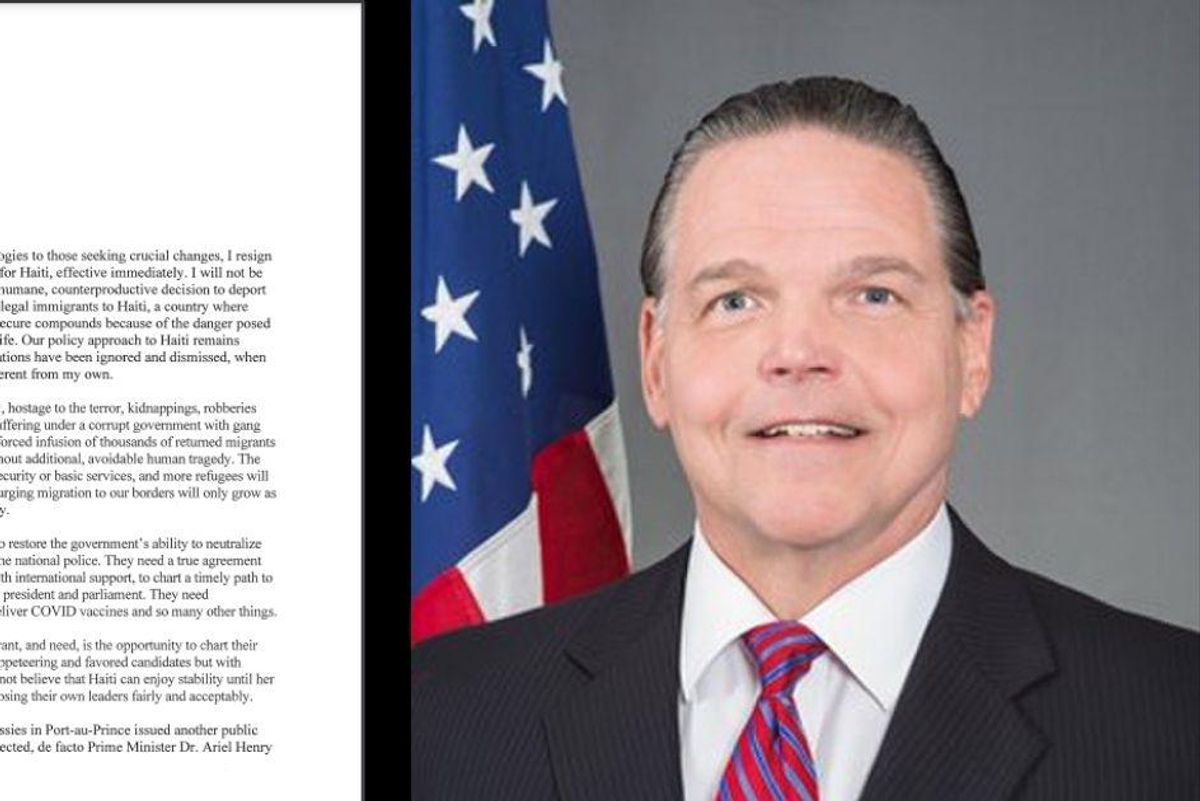Respected U.S. diplomat resigns over 'inhumane' treatment of Haitians with scathing letter
It takes a lot to push a career diplomat to quit their job. A diplomat's specialty, after all, is diplomacy—managing relationships between people and governments, usually with negotiation and compromise.
So when the U.S. special envoy to Haiti, whose "diplomatic experience and demonstrated interagency leadership have been honed directing several of the United States government's largest overseas programs in some of the world's most challenging, high-threat environments," decides to resign effective immediately, it means something.
Daniel Foote, who was appointed special envoy to Haiti in July of this year, explained his decision to quit in a strongly-worded letter to Secretary of State Blinken. His resignation comes in the wake of a wave of Haitian migrants arriving at the southern U.S. border and widespread reports of harsh treatment and deportations.
SCOOP: Special Envoy for Haiti, Amb Daniel Foote, a career member of foreign service, has RESIGNED. In his letter of resignation, he says he will not be associated with the U.S.'s "inhumane, counterproductive decision to deport thousands of Haitian refugees." Letter attached.pic.twitter.com/KlW5GoTF3u— Yamiche Alcindor (@Yamiche Alcindor) 1632397337
"I will not be associated with the United States inhumane, counterproductive decision to deport thousands of Haitian refugees and illegal immigrants to Haiti, a country where American officials are confined to secure compounds because of the danger posed by armed gangs in control of daily life," he wrote. "Our policy approach to Haiti remains deeply flawed, and my recommendations have been ignored and dismissed, when not edited to project a narrative different from my own."
Foote went on to describe the dire conditions in Haiti:
"The people of Haiti, mired in poverty, hostage to the terror, kidnappings, robberies, and massacres of armed gang alliances, simply cannot support the forced infusion of thousands of returned migrants lacking food, shelter, and money without additional, avoidable human tragedy. The collapsed state is unable to provide security or basic services, and more refugees will fuel further desperation and crime. Surging migration to our borders will only grow as we add to Haiti's unacceptable misery."
What Haiti needs, Foote wrote, is "immediate assistance" to restore order so they can hold an election for their next president and parliament, as well as humanitarian assistance.
"But what our Haitian friends really want, and need," he wrote, "is the opportunity to chart their own course, without international puppeteering and favored candidates but with genuine support for that course. I do not believe that Haiti can enjoy stability until her citizens have the dignity of truly choosing their own leaders fairly and acceptably."
Finally, he chastised the U.S. and other nations for continuing to intervene in Haiti's politics, pointing out that such policies have never gone well and will only make problems worse:
"Last week, the U.S. and other embassies in Port-au-Prince issued another public statement of support for the unelected, de facto Prime Minister Dr. Ariel Henry as interim leader of Haiti, and have continued to tout his 'political agreement' over another broader, earlier accord shepherded by civil society. The hubris that makes us believe we should pick the winner—again—is impressive. This cycle of international political interventions in Haiti has consistently produced catastrophic results. More negative impacts to Haiti will have calamitous consequences not only in Haiti, but in the U.S. and our neighbors in the hemisphere."
Of course, this is one man's opinion, albeit a presumably informed one considering his position. White House Press Secretary Jen Psaki answered questions about Foote's resignation in a press briefing, with some pushback from the administration:
Psaki: Daniel Foote, top U.S. Haiti envoy who resigned over migrant expulsions, "had ample opportunity to raise concerns about migration during his tenure. He never once did so...His views were put forward, they were valued, they were heard. Different policy decisions were made"pic.twitter.com/HCzBwCFs7R— CBS News (@CBS News) 1632414526
The most recent upheaval in Haiti comes in the wake of its president being assassinated in July. But Haiti has a long and storied history that's worth learning about to see how the U.S. and other countries have directly contributed to the current economic and humanitarian crises there. (Find an excellent read for that here.) A series of devastating natural disasters in the past couple of decades has added to the nation's suffering as well.
Figuring out the best way to help floundering countries we're partially responsible for crippling and the best way to respond to humans fleeing such places is no simple challenge. But high profile resignations such as Foote's may at least draw people's attention to places like Haiti so that we can learn and understand what has led up to the crises we face now.
- This wealthy, big-hearted woman is spending her lottery winnings in ... ›
- These cuddly teddy bears deliver a dose of delight to kids in refugee ... ›
- We spoke to a Haiti hospital after Hurricane Matthew. This is what ... ›
- Springfield residents flood Haitian restaurant with support - Upworthy ›
- 5-word phrase that helped FBI negotiator gain people's trust - Upworthy ›

